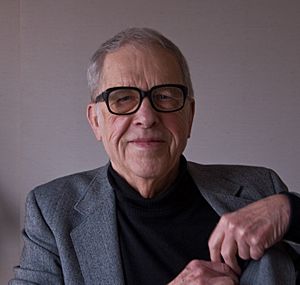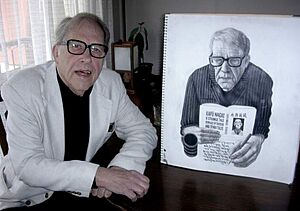Donald Richie facts for kids
Quick facts for kids
Donald Richie
|
|
|---|---|

Donald Richie in February 2009
|
|
| Born | April 17, 1924 |
| Died | February 19, 2013 (aged 88) |
| Nationality | American |
| Occupation | Author, journalist, film critic |
Donald Richie (born April 17, 1924 – died February 19, 2013) was an American writer. He was famous for writing about Japan, its culture, and especially Japanese cinema (movies). Even though he saw himself mostly as a film historian (someone who studies movie history), he also made many experimental films. He made his first film when he was just seventeen years old!
Contents
Who Was Donald Richie?
Donald Richie was born in Lima, Ohio, in the United States. During World War II, he joined the United States Merchant Marine. He worked on ships called Liberty ships as a purser (who handles money and supplies) and a medical officer. Before this, he had already published his first short story, "Tumblebugs," in 1942.
Richie's First Trip to Japan
In 1947, Richie visited Japan for the first time. He went with the American forces who were helping Japan after the war. He saw this as a chance to leave his hometown. He first worked as a typist and then as a writer for the Pacific Stars and Stripes newspaper.
While in Tokyo, he became very interested in Japanese culture. He especially loved Japanese movies. Soon, he was writing movie reviews for the Stars and Stripes. In 1948, he met Kashiko Kawakita, who introduced him to the famous director Yasujirō Ozu. Richie and Kawakita became good friends and worked together to share Japanese films with the Western world.
Returning to Japan and Writing Career
After going back to the United States for a short time, Richie studied English at Columbia University from 1949 to 1953. Then, he returned to Japan to work as a film critic for The Japan Times.
In 1959, he published his first book, The Japanese Film: Art and Industry. He wrote it with Joseph Anderson. This book was the first English-language account of Japanese movies. Donald Richie spent much of his life living and working in Tokyo. From 1969 to 1972, he was the Curator of Film at the New York Museum of Modern Art. In 1988, he was the first guest director at the Telluride Film Festival.
Richie wrote many books. Some of his most well-known books about Japan include The Inland Sea, a travel book, and Public People, Private People, which looked at different kinds of people in Japan. He also wrote collections of essays like A Lateral View and Partial Views. A special collection of his writings, The Donald Richie Reader, was published to celebrate fifty years of his writing about Japan. His diaries were also published as The Japan Journals: 1947–2004.
In 1991, filmmakers Lucille Carra and Brian Cotnoir made a movie version of The Inland Sea. Donald Richie himself narrated the film. This movie won several awards, including Best Documentary at the Hawaii International Film Festival in 1991. It was also shown at the Sundance Film Festival in 1992.
The author Tom Wolfe once said that Richie was like "the Lafcadio Hearn of our time." This means Richie was a very good link between the Japanese and American cultures, which sometimes found each other confusing. Even though Richie spoke Japanese very well, he could not read or write it easily.
Donald Richie passed away in Tokyo on February 19, 2013, at the age of 88.
Richie's Work on Japanese Cinema
Richie's most famous achievements were his studies of Japanese movies. In his books, he focused on how Japanese films were made and their unique style. He often highlighted the "presentational" nature of Japanese cinema, which was different from Western films.
Paul Schrader, a famous filmmaker, wrote in the foreword to Richie's book A Hundred Years Of Japanese Film: "Whatever we in the West know about Japanese film, and how we know it, we most likely owe to Donald Richie." Richie also wrote detailed studies of two of Japan's most famous directors: Yasujirō Ozu and Akira Kurosawa. Richie met Kurosawa on the set of Drunken Angel because he was friends with Fumio Hayasaka, who composed music for movies.
Subtitles and Commentaries
Donald Richie wrote the English subtitles for some of Akira Kurosawa's famous films. These included Throne of Blood (1957), Red Beard (1965), Kagemusha (1980), and Dreams (1990).
In the 21st century, Richie also provided audio commentaries for The Criterion Collection DVDs. He shared his knowledge on classic Japanese films by directors like Ozu (A Story of Floating Weeds and Early Summer), Mikio Naruse (When a Woman Ascends the Stairs), and Kurosawa (Drunken Angel, Rashomon, The Lower Depths, and The Bad Sleep Well).
Books by Donald Richie
Here are some of the books Donald Richie wrote:
- The Honorable Visitors. Charles E Tuttle; 1949; ISBN: 0-8048-1941-6
- With Watanabe Miyoko. Six Kabuki Plays (paperback). Hokuseido Press; 1953; ISBN: 1-299-15754-8
- Where Are the Victors? Tuttle Publishing. 1956. ISBN: 978-0804815123.
- With Joseph L. Anderson. The Japanese Film: Art and Industry (paperback). Princeton University Press; 1959, revised 1983; ISBN: 0-691-00792-6
- Japanese Movies. Japan Travel Bureau, 1961
- The Films of Akira Kurosawa. University of California Press, 1965. 3rd edition, expanded and updated, 1998. ISBN: 978-0-520-22037-9
- The Japanese Movie. An Illustrated History (hardcover). Kodansha Ltd; 1965; ISBN: 1-141-45003-8
- Companions of the Holiday (hardcover). Weatherhill; 1968; ISBN: 1-299-58310-5
- George Stevens: An American Romantic. New York, The Museum of Modern Art, 1970.
- Zen Inklings: Some Stories, Fables, Parables, and Sermons (Buddhism & Eastern Philosophy) (Paperback) with prints by the author. Weatherhill, 1982. Without prints: 1982. ISBN: 9780834802308
- Different People: Pictures of Some Japanese (hardcover). Kodansha Inc; 1987; ISBN: 0-87011-820-X
- Focus on Rashomon (hardcover). Rutgers University Press; 1987; ISBN: 0-13-752980-5
- Introducing Tokyo (hardcover). Kodansha Inc; 1987; ISBN: 0-87011-806-4
- Introducing Japan (hardcover). Kodansha International; 1987; ISBN: 0-87011-833-1
- Japanese Cinema: Film Style and National Character (paperback). Oxford University Press; 1990; ISBN: 0-19-584950-7
- Japanese Cinema: An Introduction (hardcover). Oxford University Press; 1990; ISBN: 0-19-584950-7
- The Inland Sea (paperback). Kodansha International; 1993; ISBN: 4-7700-1751-0
- The Temples of Kyoto (hardback). Tuttle Publishing; 1995; ISBN: 0-8048-2032-5
- Partial Views: Essays on Contemporary Japan (paperback). Japan Times; 1995; ISBN: 4-7890-0801-0
- Memoirs of the Warrior Kumagai: A Historical Novel (hardcover). Tuttle Publishing; 1999; ISBN: 0-8048-2126-7
- Tokyo: A View of the City (paperback). Reaktion Books; 1999; ISBN: 1-86189-034-6
- and Stone Bridge Press; 2010; ISBN: 1-880656-69-8
- With Roy Garner. The Image Factory: Fads and Fashions in Japan (paperback). Reaktion Books; 2003; ISBN: 1-86189-153-9
- Japanese Literature Reviewed (hardcover). ICG Muse; 2003; ISBN: 4-925080-78-4
- A View from the Chuo Line and Other Stories (paperback), Printed Matter Press, 2004, SBN 4900178276
- With Hillary Raphael, Meital Hershkovitz. Outcast Samurai Dancer, Creation Books, 2004, ISBN: 978-1840680980
- Tokyo Nights (paperback). Printed Matter Press; 2005; ISBN: 1-933606-00-2
- Botandoro: Stories, Fables, Parables and Allegories: A Miscellany (paperback), Printed Matter Press; 2008; ISBN: 978-1-933606-16-3
Films by Donald Richie
Donald Richie made about 30 experimental films. They ranged from five to 47 minutes long. Six of these films were released on DVD as A Donald Richie Film Anthology (Japan, 2004). These films were originally shot on 16mm film:
- Wargames (1962), 22 minutes
- Atami Blues (1962), 20 minutes, with music by Tōru Takemitsu
- Boy With Cat (1967), 5 minutes
- Dead Youth (1967), 13 minutes
- Five Philosophical Fables (1967), 47 minutes
- Cybele (1968), 20 minutes
Other films he made include:
- Small Town Sunday (1941, 8mm)
- A Sentimental Education (1953)
- Aoyama Kaidan (1957)
- Shu-e (1958)
- Life (1965)
- The Inland Sea (1992), he wrote the screenplay
- Akira Kurosawa (1975), 58 minutes
- A Doll (1968), 20 minutes
- A Couple (1968)
- Nozoki Monogatari (1967)
- Khajuraho (1968)
Awards and Honors
Donald Richie received several awards for his work:
- Kawakita Award (first recipient in 1983)
- Japan Foundation: Japan Foundation Award (1995)
- John D. Rockefeller 3rd Award (Asian Cultural Council) (1993)
- National Society of Film Critics Awards, USA: Special Award (1971)
 | Charles R. Drew |
 | Benjamin Banneker |
 | Jane C. Wright |
 | Roger Arliner Young |


